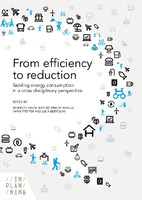From efficiency to reduction
Tackling energy consumption in a cross disciplinary perspective
Contributor(s)
Savini, Federico (editor)
Pineda Revilla, Beatriz (editor)
Pfeffer, Karin (editor)
Bertolini, Luca (editor)
Collection
Dutch Research Council (NWO)Language
EnglishAbstract
This book presents the results of the international research project CODALoop: Community Data Loop for Energy Conscious Lifestyles. It dissects the energy practices that make urban households demanding energy in their daily life and reveals the pathway towards reducing this energy demand. To unpack energy practices, the authors of this volume move away from efficiency problems studying the interaction between human and new technologies. Instead, they use a repertoire of different analytical instruments to study how interaction between humans, and between humans and data, change the social norms that shape energy needs.
The volume offers a synthesis of a cross- disciplinary study of energy reduction carried out in three different countries through multiple methodological approaches. The project at the source of the book was funded under the Joint Program Initiative 'Urban Europe' and the ERA-net framework.
To unpack energy practices, the authors of this volume move away from efficiency problems studying the interaction between human and new technologies. Instead, they use a repertoire of different analytical instruments to study how interaction between humans, and between humans and data, change the social norms that shape energy needs.
The volume offers a synthesis of a cross- disciplinary study of energy reduction carried out in three different countries through multiple methodological approaches. The project at the source of the book was funded under the Joint Program Initiative 'Urban Europe' and the ERA-net framework.
Keywords
energy; consumptionDOI
10.17418/B.2019.9789491937439Publisher
In PlanningPublication date and place
2019Classification
Energy industries and utilities


 Download
Download